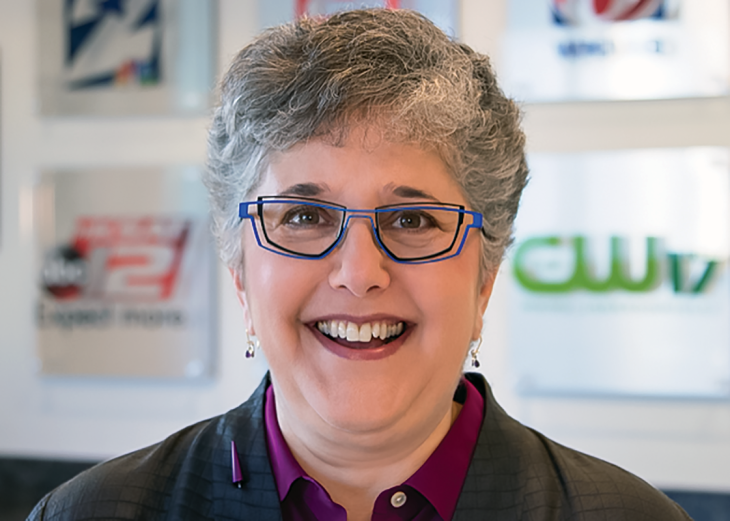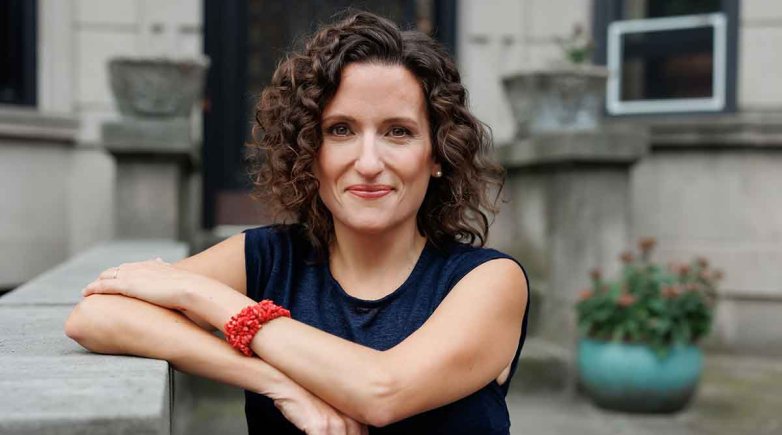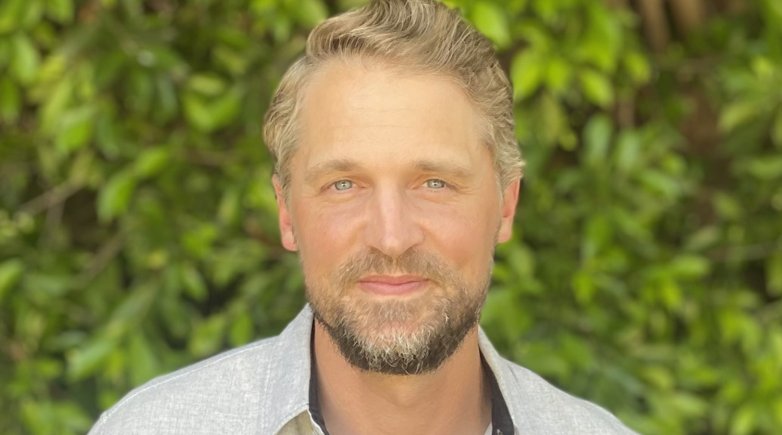Emily Barr

"I believe the core of our democracy thrives when it has strong local journalism paying attention."
When a local newspaper stops publishing, the community loses a vital resource that notifies, connects and impassions. Emily Barr ’76, one of broadcast media’s most accomplished female executives, is on a mission to ensure that never happens again in Maine, her newly adopted home state. “We need good investigative journalism to tell our most important stories to hold the powerful accountable, to stay informed,” Barr says.
Last summer, Barr teamed up with other veteran media industry leaders to establish the nonprofit Maine Journalism Foundation. Though Maine has a strong tradition of independent journalism, Barr is keenly aware of the closures and cutbacks that have befallen so many outlets elsewhere. The foundation is designed to function as a proactive force, raising funds and, in some cases, buying media properties outright to preserve their ability to serve their local communities.
Now retired after a 43-year broadcast career, Barr once ran seven TV stations in major markets across the country. Working to build trust among viewers in each region, she says, helped define her core beliefs about modern society’s need for an independent press.
We spoke with Barr in June, as she was deep in the work of raising money for the new nonprofit organization.
How did the Maine Journalism Foundation come to be?
I serve on the board of the Associated Press, and a fellow board member introduced me to a couple other people who shared concerns about the future of newspapers. We decided that now is the time to act. So, a small group of us — including Bill Nemitz, a former Portland Press Herald columnist who recently retired after a 45-year career in journalism, and Bill Burke, a longtime executive of Time Warner/Turner Broadcasting System and founder of The Optimism Institute — formed the Maine Journalism Foundation. We wanted to generate awareness of the need for strong local news. Our goal is to make sure that it continues and thrives.
What are some of the challenges surrounding newspapers right now?
The economics of news coverage has really been hurt in the last few decades. Covering the news has gotten expensive, and people don’t want to pay for it. Plus, across the country, firms on the private equity side have been purchasing local, regional and even some national newspapers. They buy the papers up, consolidate as much as possible, cut the staff by as much as they can, sell off the real estate and basically drain them of their essence. Many of us in the industry worry about what these companies might do to the future of newspapers.
The Maine Journalism Foundation is in the middle of its first major initiative: helping facilitate the purchase of the state’s largest network of independent news and media outlets, Masthead Maine (which publishes 30 daily and weekly newspapers across the state), by the National Trust for Local News, a nonprofit dedicated to preserving community news throughout the country. What is the overall goal once this deal closes?
We are thrilled to have forged this collaboration with the National Trust for Local News and are delighted that these papers will be allowed to continue with their mission of informing, celebrating and serving the people of Maine. In terms of the business model, the details are still being worked out but the idea is to combine online and print advertising with philanthropy and ongoing community support. That has proven to be a pretty good model. We have to start thinking about these entities the way we think about things like hospitals: They can be for profit or not, but they often have a philanthropic side to them that raises money to help support what it is they do.
Why have you taken up this particular mantle of advocacy?
I have enormous respect for journalism. I have worked in and around journalism and managed journalists for many, many years. I believe the core of our democracy thrives when it has strong local journalism paying attention. You’ve got to be a bit of a watchdog, a bit of a champion — those school board meetings, those water reclamation meetings become very important. And we don’t always realize how important it is until we don’t have it.
Does the foundation have plans for any initiatives outside the newsroom?
Our primary focus is local news, but we also believe there is a need for teaching civics in our schools, because nobody does anymore. Younger kids need to learn how our government works at the local level, state level and federal level. Then they should understand how to have a civil discussion and argument because all you have to do is look at what’s going on today — nationally as well as locally, in many places. You can see that it’s all falling apart. We would love to, one day, help create a curriculum that could be used in both elementary and secondary schools in Maine.
Speaking of preparing students for the real world, how do you feel Exeter prepared you?
I went to Exeter at an interesting time. The school had only recently gone coed. So, the first thing I had to learn was how to speak up and make myself known in what was often a room full of boys. That was actually a great lesson. It was hard when I was going through it — I remember feeling unsure of myself, but it helped me develop a fair amount of confidence. When I got into broadcast media after college, I wasn’t at all intimidated by the men I worked with because Exeter primed me for dealing with that.
Are you still in touch with any of your classmates?
I lived in Amen Hall the two years I was there with this core group of 12 exceptional women, and we manage to get together almost every summer. We’ve missed a few because of COVID and schedules, but for about 12 years now, since the first of us retired, we’ve organized reunions all over the country. We really think of ourselves, in some ways, as having raised each other during those teenage years. It was a different time. We were largely left to our own devices. You didn’t have cellphones, and your parents didn’t call you often. We leaned on each other, and we had a really tight bond as a result.
It was a different time, and yet today people seem somehow even more disconnected. How do you see local news as a potential remedy?
In the last 20 years or so, we’ve all gone to our separate corners, and we get the news that fits what we believe in. But then we can’t have a dialogue because my information is different from your information. We can’t find a single thread that’s common. That’s dangerous. We have to shift the conversation to say: If you’re going to find out what’s going on in your community, then you need to have a single source, or at least a common source, of information that is trusted. Trust is key. A local paper is doing the work every single day, regardless, so that at the end of it all, people say, “I read that newspaper, I go to that website because I trust what it is they’re telling me. I know they’re going to be there every single day. Right when I need them.”
— Danielle Cantor
Editor's note: This article first appeared in the summer 2023 issue of The Exeter Bulletin.


